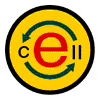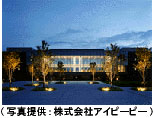E-CELL Consortium
* This laboratory has been completed.
This consortium aims to lead the world in the field of bio-informatics by gathering software technologies from throughout Japan. Member companies will dispatch young researchers to Keio University's Shonan-Fujisawa Campus or the Tsuruoka Town Campus for a period of one to three years. These researchers will be engaged in software development or model construction as members of the E-CELL project under the leadership of Keio University. Results obtained shall first be made available to member companies. The consortium plans to release results at academic meetings and publicize the results around the world under the logo marks of the member companies. n(* photo on the right : provided by IPP)nn


Background
In recent years, cell modeling computer simulation has been attracting attention as a new methodology to understand the dynamic behavior of complex intra-cell metabolism. This will be one of the most important technologies in the 21st century in terms of its applications to industries including medical care, development of drugs, industrial applications of microorganism and environmental purification. SFC started the “E-CELL project” for cell simulation in 1995, developed the base software for simulation and constructed various cell metabolic models using this software. However, software technology and modeling technology for cell simulation are still under development and there are many problems to be solved before a large-scale cell model can be constructed.
Challenges to be considered
1) Improvement of the simulator core
- Response to the distributed object environment
- Parallel simulations
- Support of space information common to different algorithm modules
- Development of methods to import information to compilers other than GNU and platforms other than Linux such as icc or ccc and C++.
- Support of front-end languages other than python
2) Development of session description/management, and user interaction
- Development of a session monitor GUI (corresponds to GUI for conventional E-CELL)
- A toolkit for developing the front end
- Session description framework (including numerical analysis)
- Session distribution and parallel frameworks
3) Development of a modeling environment
- Definition of EML (XML based model description language)
- Script based modeling environment
- Development of an intelligent model editor
- Development of a project database
- Development of a database facade
- Development of an automatic model creation program
- Development of a cell simulation open portal web site
Research plan and expected results
This project constructs advanced E-CELL software bases and models that may be shared within the cell simulation research communities that meet the following requirements, and seeks opportunities to apply this technology to food, drug and medical fields.
1) Platform:
- Is open source and is independent of a specific computer platform
- Has a broad scalability that includes equipment from desk-top computers to computer centers
- Preferably, the core should have portability
2) Simulator:
- Allows the user to develop a new computational algorithm or a data structure in a plug-in form
- Allows mixture of sub-models that are driven in different computational algorithms or time scales
- Shares common space information expressions
- Enables parallel computation
3)Modeling/simulation environment:
- Easily understood using the front end
- Easily customizable for each project or user
- Suitable for linking with databases
Researchers, managers and professors
| Masaru TomitaDirector | Professor, Faculty of Environment and Information Studies |
|---|---|
| Yasuhiro Naito | Professor Faculty of Environment and Information Studies |
| Koichi Takahashi | Project Professor Graduate School of Media and Governance |
| Kazuharu Arakawa | Associate Professor, Faculty of Environment and Information Studies |
| Haruo Suzuki | Associate Professor, Faculty of Environment and Information Studies |
| Moriyoshi Koizumi | Researcher, Keio Research Institute at SFC |